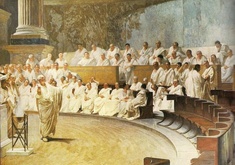
Is Democracy Even Good?
Blog by
Last updated: Sunday March 17th, 2024
Report this blog
Last updated: Sunday March 17th, 2024
Report this blog
+7
Quick Links
This blog is a brief discussion and analysis of the pros and cons of democratic forms of government, complemented with relevant historical examples and philosophical works.
It is chiefly intended for students of any level due to the intricate information provided, but anyone interested in politics/society should find it informative. Many of the examples relate to American and European history. For ease of learning, I have provided some hyperlinks to Encyclopedia Britannica or other relevant websites for certain specific terms or events not covered in detail in this article.
Several annotations can be found throughout the blog elaborating on a particular concept or providing more information. These link to the Notes section.
It is chiefly intended for students of any level due to the intricate information provided, but anyone interested in politics/society should find it informative. Many of the examples relate to American and European history. For ease of learning, I have provided some hyperlinks to Encyclopedia Britannica or other relevant websites for certain specific terms or events not covered in detail in this article.
Several annotations can be found throughout the blog elaborating on a particular concept or providing more information. These link to the Notes section.
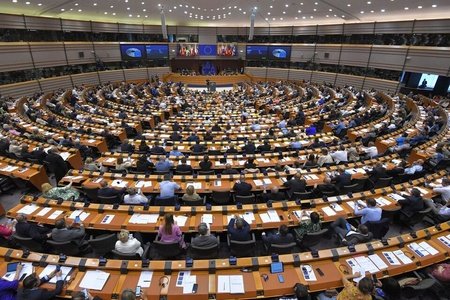
The European Parliament: a prime example of representative democracy; it consists of 705 members proportionally elected by the public from individual EU member states, legally aiming at resolving the issues each country faces and safeguarding liberty and democratic governments throughout Europe
Overview
Democracy (derived from the Greek words ‘demos’ and ‘kratos’) is a form of government in which the state is primarily run according to the needs of the general public. Its defining feature is the designation of officials by the general public through ‘fair and free’ elections. It is distinct from an oligarchy, autocracy, or other authoritarian systems as political power is mostly vested in the people, whose general will—the majority—typically determines the country’s political action.
Whilst originating in Ancient Athens in the fifth century BCE, widespread democracy is a relatively recent development. The first country to permanently grant universal suffrage [1] (excluding women) was the United States [2], and most European nations would only rid themselves of authoritarian regimes after World War Two. As of 2022, according to The Economist Democracy Index, just over 40% of UN member states are democratic, with the rest categorised as authoritarian or near-authoritarian. This has led many to question its viability, with British Prime Minister Winston Churchill encapsulating the opinion of many in claiming that:
"No one pretends that democracy is perfect or all-wise. Indeed, it has been said that democracy is the worst form of government except all those other forms that have been tried from time to time"
— Winston Churchill [3]
Therefore, is the Western assumption that democracy is the only workable form of government false?
Liberty and Egalitarianism
Democracy is widely perceived as the only form of government that can ensure the maximal contentment of citizens—to bestow everyone the right to “life, liberty and the pursuit of happiness” (The US Declaration of Independence). A government legally bound by a constitution to protect its citizens' welfare affirms the existence of certain fundamental liberties—naturalist or positivist—that must be safeguarded for the common good.
The Universal Declaration of Human Rights promulgates thirty freedoms every nation must protect, including “a fair and public hearing by an independent and impartial tribunal” (Article 10), the “right to freedom of opinion and expression … without interference” (Article 19), and the right to “social security, and the economic, social and cultural rights indispensable for his dignity” (Article 22). Being fundamental principles , they must be granted to every citizen “without distinction of any kind, such as race, colour, sex, language, religion, political or other opinion, national or social origin, property, birth or other status” (Article 2). Hence, democracy intrinsically aims at providing every citizen an equal opportunity to achieve happiness from a political standpoint since “the absence of freedom is the presence of death” (Martin Luther King Jr.).

First Lady Eleanor Roosevelt holding the Universal Declaration of Human Rights (1948): a United Nations proclamation of thirty fundamental human liberties which could not be infringed by member states; there is a correlation between freedom and democracy since only constitutionalist, non-authoritarian governments can seemingly safeguard human rights
Many hold that no other government system can have a state compelled to interest itself in the people; the contrast between absolutist governments having total political authority, such as bureaucracy, oligarchy, plutocracy and theocracy, and those democratic is evident. For instance, in mid-nineteenth-century Europe—dominated by absolute monarchies—workers had to revolt (the 1848 Revolutions) to achieve regulation of food prices, workers’ protection and the right to assemble in trade unions, illustrating the failure of authoritarianism in considering the public’s contentment. Nowadays, authoritarian countries such as Afghanistan, Venezuela and Eritrea continuously undergo financial crises and food shortages, requiring foreign aid from democratic nations. Can citizens be truly gratified if the government is not obligated to protect people’s rights and represent their concerns?
Furthermore, democracy empowers a sense of solidarity and concern for fellow citizens. The social contract theory declares that one must safeguard the rights of the entire community to restrain government overreach, heightening one’s interest and devotion to their homeland: “In democratic ages, men … show a general compassion for all the human race” (Alexis de Tocqueville, "Democracy in America, Volume II"). It comes as no surprise, then, that the World Happiness Report of 2023 found that the top twenty ‘happiest’ countries are also among the most democratic. [4]
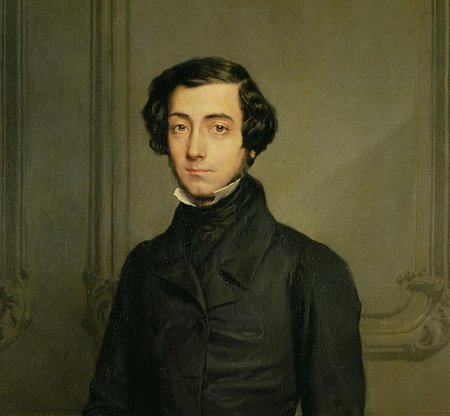
French sociologist and political thinker Alexis de Tocqueville: author of "Democracy in America"; his work, whilst largely neutral about the prevalence of democracy in the United States, links industrialisation, economic growth, equality and patriotism to the political representation of the public in government, and describes democracy as a way of life [5]
As previously mentioned, democracy is the sole political system which places citizens at equal value, reflecting the natural law doctrine that "all men [people] are created equal" (The US Declaration of Independence). The Universal Declaration of Human Rights mandates egalitarianism—this doctrine that all individuals are equal in value and deserve equal rights, privileges and opportunities, regardless of their characteristics.
This extends to legal equality: “All are equal before the law and are entitled without any discrimination to equal protection of the law” (Article 7 of the "Universal Declaration of Human Rights"). In a democratic society, individuals—innocent or guilty—have the right to defend themselves in court to preserve the rule of law. This incorporates the tenets of presumption of innocence, impartiality of the court, right to counsel (a lawyer), prevention from arbitrary arrest and a sufficient court hearing.
The Dreyfus Affair perfectly displays the cruciality of legal and characteristic equality in a democracy. In 1894, French courts convicted Jewish captain Alfred Dreyfus of treason without sufficient evidence, probably solely due to the jury’s antisemitic views. Many prominent government officials, such as Georges Clemenceau, publicly accused the judiciary of not abiding by the principle of equality under the law. The courts felt pressured to reopen the case, and justice was eventually served to Dreyfus, as he was exonerated in 1906. A true democracy grants everyone the equal opportunity to enjoy their liberties, disregarding any prejudice based on character.

Illustration of a court hearing during the Dreyfus Affair, in which legal action was taken against Jewish captain Alfred Dreyfus merely because of his beliefs, but was later acquitted to preserve the judiciary's integrity: democratic governments strive for legal equality among citizens, regardless of their traits
People Rule
Democracy is characterised by popular sovereignty [6]—literally meaning the people (‘popular’) rule (‘sovereignty’)—by which the people’s will dictates state affairs. This stems from the social contract theory, propagated by political theorists Thomas Hobbes, John Locke and Jean-Jacques Rousseau, ensuring that the state defends the people’s liberties and the people ensure they are preserved.
The social contract between government and citizens is represented in a constitution—the indispensable object enforcing democracy in a country, binding political representation and freedoms to law. Constitutionalism serves two primary purposes: limiting the state’s authority and empowering the people to enjoy fundamental rights, which collectively grant political representation to the public: “The principle of any sovereignty resides essentially in the Nation” (Article III of the “Declaration of the Rights of Man the Citizen”). The judiciary ensures that government action and policy are compatible with the nation’s constitution.
Political power is also decentralised through the separation of powers—the division of state authority into distinct branches carrying out different functions, typically in the Trias Politica model: legislative (enacting laws), executive (enforcing laws), and judicial (defending the law). French political theorist Montesquieu was its chief proponent, delineating the tripartite model in his treatise “The Spirit of Laws”. Checks and balances are also implemented, such that each branch of government is empowered to prevent overbearing actions from other branches, allowing a fairer power distribution.

Representation of the French Constitution of 1848 which granted universal male suffrage and liberalised the French legislature: constitutionalism is integral for a democracy since it conditions the government to act in the people's interests, besides granting civil liberties and preventing authoritarianism
To enforce popular sovereignty, ‘free and fair’ elections of government officials are held under universal suffrage. Article 23 of the Universal Declaration of Human Rights posits that “the will of the people shall be the basis of the authority of government; this will shall be expressed in periodic and genuine elections which shall be by universal and equal suffrage”.
In a representative democracy [7], the people determine the politicians who best mirror their interests through the vote, and the consensus on which figure/party should lead the country is based on majoritarianism—who gets over 50% of the vote either independently or through coalitions: “The vital principle of republican governments is the … will of the majority” (James Madison). Nonetheless, proportional representation ensures that the voice of the minority is represented in government, also allowing for competition between political factions to prevent the dominance of just one. ‘Fair’ elections guarantee political egalitarianism between voters, regardless of their traits, encapsulated in the ‘one person, one vote’ principle. They are also ‘free’ to associate themselves with their ideology and candidate of choice.
The cruciality of voting is best represented with the passage of the Fifteenth Amendment in 1869 during the Reconstruction Era. Prior to this, Blacks in the American South could not influence their state legislature since they were deprived of the right to participate in elections, but the expansion of suffrage to incorporate them resulted in the ascendancy of Black Congressmen. A slew of legislation precluding discrimination followed, such as the Civil Rights of 1875, but once the Fifteenth Amendment became undermined by poll taxes, discrimination was prolonged.

Black citizens at a voting booth in the American South during Reconstruction: the first time Blacks could vote in elections in American history; democratic reforms enacted after the Civil War, such as the passage of the Fifteenth Amendment expanding suffrage, allowed Blacks to voice their concerns effectively as some Black representatives and senators were elected to Congress; democracy is the only form of government which can remotely actuate the will of the public through 'free and fair' elections [8]
In a true democracy, elections are not hindered by government interference, such as coercion, voter suppression and fraud, so that they serve as an unblemished voice of citizens’ political demands. Countering the integrity of elections undermines popular sovereignty, as seen in the March 1933 German federal election. Then, the NSDAP intimidated the electorate through terror to elect Nazi candidates, culminating in NSDAP leader Adolf Hitler establishing a dictatorship.
The media brings the political scene to the people, faithfully reporting government activity. Whilst typically undermined by bias in cherry-picking or misconstruing information, freedom of the press is integral to a democracy, whereby the public can assess government actions and whether it is syncretic with their needs. Authoritarian regimes stifle this liberty to eradicate any ‘unregulated’ information about the government passed to the people besides indoctrination; in other words, whatever the government says cannot be evaluated.
The media coverage of the Watergate scandal was indispensable in generating public outcry against the presidential cabinet, which was seen as undemocratic. In 1973, American journalists began exponentially reporting on US President Richard Nixon’s involvement in the Watergate break-in to attempt to meddle with the 1972 Democratic National Convention, giving him an unjust advantage in the presidential election of 1972. With the public aware of this blatantly unconstitutional act (as determined by the Supreme Court decision United States v. Nixon), President Nixon felt pressured to resign. A similar occurrence was observed in the First Arab Spring, in which both media outlets and social media platforms allowed citizens to organise protests effectively and overthrow autocratic regimes in the region. Crucial in a democracy, the media serves to check government power by transparently communicating government actions, allowing citizens to defend popular sovereignty.
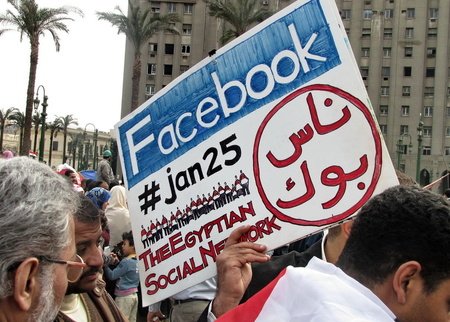
The media's role in the First Arab Spring, integral in citizens managing to protest authoritarianism: the media, whilst imperfectly, exposes the truth about the nation's political status quo for the public to assess, and in the case in which it is displeased, it is enabled to act against the government
Unqualified Public
Opponents of democracy argue that the general public is unqualified to nominate its leaders and too self-centred to consider the needs of the entire nation. In fact, despite being democratically elected, most current Western leaders have a low approval rating for not acting in the citizens’ interests, such as French President Emmanuel Macron, whose 2023 pension reform was derided as authoritarian; it seems that the public is not judicious or educated enough to choose leaders to represent it faithfully.
The Greek philosopher Plato admonished democracy for “dispensing a sort of equality to equals and unequals alike” (Plato, “The Republic”), distinguishing between virtuous and wise citizens capacitated to decide which policies are best for the nation and selfish and unperceptive citizens who only consider their own needs. He claimed that democracy invariably devolves into demagoguery, citing the ascendancy of Alcibiades—a charismatic and smooth-talking statesman appealing to the public—who contributed to Athens’ failure in the Peloponnesian War. To remedy this, Plato, and other Greek thinkers such as Aristotle, favoured an oligarchy of philosopher-kings—virtuous men knowledgeable in state affairs and morally bound to serve their subjects.
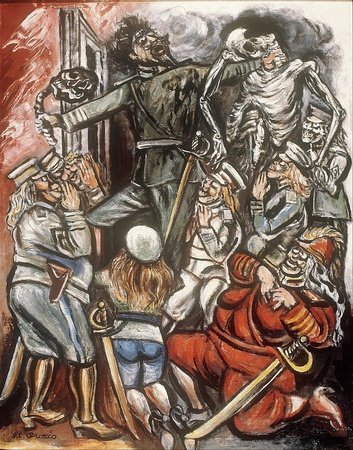
"The Demagogue": a painting showing the oratorical capabilities of a ruler in appealing to the public, with citizens deluded by his charm and blindly trusting him; democracy requires the participation of the general public to elect officials to represent them well, but most people are arguably unqualified, ignorant or apathetic towards politics, resulting in 'unvirtuous' politicians being elected
Besides lack of qualification, public ignorance may take the form of apathy towards politics. Modern trends tend towards decreasing voter turnout in elections and lesser activity from citizens in response to political developments, which may cause the unpopularity of twenty-first-century politicians. Allowing the people’s will to dictate who rules the country is dangerous in a society largely disinterested in national and local politics.
For instance, low voter turnout among Blacks in the United States has hindered further Democrat success in elections, and left-wing Norwegian parties also tend to fare worse due to apathy from certain social groups. On a graver magnitude, passive citizenship inhibits political progress pushing politicians to pursue the people’s will. In Malta, the declining number of protests and voter turnout over the last three decades has coincided with unconstitutional government behaviour and corruption, such as backroom deals with foreign corporations and the assassination of local journalist Daphne Caruana Galizia. Historically, the unification of Italy was prolonged by years owing to farmers’ disinterest in petitioning the government, seeing that it would not directly benefit them. Hence, it is manifest that politically passive people, prevalent in any democracy, have been found to be more socially detached and excessively individualistic.
Some disapprove of the ‘majority rule’ principle of democracy, seeing majoritarianism and oppression of those in the minority. The domination of the majority, no matter how slim, has been dubbed a form of “tyranny” since it annuls the will of the minority, even when the latter has been proven right. UK politician Lord Acton wrote: “The one pervading evil of democracy is the tyranny of the majority, or rather of that party, not always the majority, that succeeds, by force or fraud, in carrying elections”. An infamous example is the 2016 Brexit referendum, in which the will of a million out of a country of seventy million determined arguably the most significant British political event in the twenty-first century, even though approximately fifty-five per cent of Britons now regret this decision.

Modern cartoon displaying the relationship between voter apathy and lobbyism: many democratic governments suffer from corruption, corporatism and downright disengaged politicians, perhaps a product of the public's general lack of interest in responding to this development and taking action—in participating in politics
Inefficacy
Besides the people’s flaws, democratic systems have intrinsic defects limiting the extent to which they faithfully represent the public will. The very presence of elections means that third parties must be consulted to gain an electoral advantage, be it through financial aid or a few extra votes. Forging deals with big business—corporatism—bestows excessive authority to executive businessmen “robber barons”, such that their demands unjustly influence legislation. The 2010 US Supreme Court decision Citizens United v. FEC allowed unlimited corporate contributions to candidates. This may have undemocratically determined the outcome of certain presidential elections ever since, as the ‘one man, one vote’ virtue is annulled.
Virtually every democratic legislature is plagued with corruption, with politicians unconstitutionally allowing business interests to prevail over the public’s. Two direct examples of this are the 1994 Cash for Questions scandal, in which House of Commons discussions in the United Kingdom were determined by the whims of corporations handing payouts to members of Parliament, and the 2010s Steward hospital deal in Malta, in which €350 million [9] of taxpayers money was used to allow Steward Health Care to manage three local hospitals in exchange for political connections.
Moreover, many positions of power in government are handed to unqualified individuals who are merely affiliated with a particular political party or have certain special interests. This was probably the sole reason UK politician David Cameron was appointed Foreign Secretary in 2023. Despite having been out of office for years and generally unpopular among the public, he was once again allowed to influence the administration without the people’s consent. This is hardly a recent trend; for instance, patronage reigned supreme in nineteenth-century United States political history, as many then-presidents maintained that “to the victor belong the spoils” (William L. Marcy). In the latter half of the century, the political machine Tammany Hall had deep ties with the New York Democratic Party, promising special jobs for Democratic voters, which skewed the results of every presidential election of the time.

"The Bosses of the Senate": a popular cartoon displaying the unjust influence of chief businessmen in Congress during the Gilded Age; corporatism and corruption are widely exercised by figures of authority to help them get elected; the voice of the people seems to be stifled by the influence of capital and spoils
The media can also undermine core democratic values in unfaithfully reporting the national political scene. Intentionally spreading misinformation, or skewed information, leads to citizens passing political judgements based on inaccurate or incomplete information, which bears the gravest consequences in the voting process. There are several tactics media outlets, be it in the form of journalism, social media, the Internet, et cetera, employ to mislead citizens, which must be detected and realised for the safeguarding of democracy.
Sensationalised reporting and biased coverage distorts the reality of political events, creating a polarised and divisive environment. When media outlets prioritize sensationalism over objectivity, they may contribute to the erosion of trust in institutions and hinder constructive political discourse. Media outlets have the power to shape public opinion by choosing which stories to cover and how to frame them. If they prioritise certain issues over others, they can influence public perceptions and agenda setting, potentially neglecting important topics and ignoring the concerns of certain groups within society.
Media outlets often rely on advertising revenue, and this dependence can lead to a compromise of journalistic integrity. If advertisers or corporate interests exert undue influence on media organizations, it may result in biased reporting or the suppression of stories that could be unfavorable to those interests. Digital media, especially social media, can contribute to the creation of echo chambers and filter bubbles, where individuals are exposed primarily to information that aligns with their existing beliefs. This can lead to polarization, as people may become less open to different perspectives and more susceptible to misinformation.

Modern cartoon depicting Putin's influence on Tucker Carlson in the latter's interview with him, as he seems to be unjustly favourable to Russia's present state: a democracy relies on fair, reliable media coverage to inform citizens of the national and global state of politics for them to pass judgement, but it is often undermined by misinformation and skewing of facts, inhibiting citizens from accurately assessing the political status quo [10]
Conclusion
Democracy is the only political system that considers the masses’ concerns and effectively protects civil liberties due to constitutionalism, free elections and decentralisation of government power. The prevalence of popular sovereignty renders such governments "of the people, but the people, for the people" (Abraham Lincoln, 'The Gettysburg Address'). However, democracy is riddled with many faults hindering the people’s will from being actuated, namely passive citizenship, corruption, partisanship, corporatism and a lack of merit. Whilst authoritarian regimes oversee a lower level of civil liberty and political representation, one can argue that they are more effective in guaranteeing citizens' happiness, but, in practice, this is not reflected in global research due to the extreme concentration of power in a few officials, allowing them to act rule as they wish.
Hence, it seems that democracy is the only viable form of government, but many amendments must be made to resolve its issues. With the public's lack of understanding of its role in government plaguing democracy, education is a crucial mechanism to educate the masses on evaluating politicians' performance in government. Active citizenship must be encouraged; citizens must learn to appreciate their country and strive for the common good, chiefly through protests and keeping themselves informed about political developments. Some propose a more technocratic system [11] to impose meritocracy further, limiting suffrage to those who pass a political test and only allowing experts to occupy positions of power within their respective fields; for example, only doctors could become health ministers. To limit the unwarranted influence of third parties such as businesses, some argue that the judiciary should be empowered to block legislation it deems unconstitutional more often. The abolition of political parties could limit partisanship and political divisions, perhaps allowing more collaboration between politicians. Ultimately, it is the citizen who needs to take action to improve the state of democracy, as expressed by US President John F. Kennedy:
"In a democracy, every citizen, regardless of his interest in politics, 'holds office'; every one of us is in a position of responsibility; and, in the final analysis, the kind of government we get depends upon how we fulfil those responsibilities. We, the people, are the boss, and we will get the kind of political leadership, be it good or bad, that we demand and deserve."
— John F. Kennedy
Notes
[1] Universal suffrage is the right of all adult citizens—in some cases, even some teenagers—regardless of financial status, sexual orientation, colour, race, et cetera, to vote in national and local elections.
[2] During the era of Jacksonian democracy (from the mid-1820s), most states removed the taxation requirement and granted all white male citizens the right to vote; only South Carolina would thereon limit the right to vote to the state legislature (until the 1860s). Full universal suffrage was not realised in the United States until the ratification of the Nineteenth Amendment in 1920, bestowing women the right to vote. However, many Blacks were still barred from voting due to Jim Crow laws, so one can argue that it was only with the passage of the Civil Rights Act of 1964 that all citizens in the United States were definitively allowed to vote in elections.
[3] Contrary to popular opinion, Churchill did not admonish democracy and still, in fact, deemed it the best form of government, especially relative to other authoritarian forms "that have been tried from time to time" including Stalin's Soviet Union and absolute monarchies during the 'ancien régime'. He merely intended to point out the flaws in democratic systems.
[4] One must be mindful of the possible inaccuracies in such surveys and the inconsistencies between different results. For instance, another survey conducted at a similar time listed Mexico and Venezuela as the top happiest countries, even though they are less democratic than those mentioned in the World Happiness Report.
[5] As mentioned, De Tocqueville's work was not meant to praise democracy but to analyse why it succeeded in the United States. He also pointed out the general passivity among citizens and potential "tyranny of the majority" linked to the United States' political situation.
[6] 'Popular sovereignty' in the democratic context is not to be confused with 'popular sovereignty' in the American historical context, although the latter is an example of the former. In the antebellum United States, 'popular sovereignty' refers to Illinois Representative Stephen A. Douglas’s 1854 proposal regarding the legality of slavery in the United States. He encouraged states to individually hold popular referendums on whether the institution should be preserved rather than the federal government deciding for itself.
[7] A representative democracy, also known as 'indirect democracy', involves the designation of individuals by the public to represent their concerns in government, rather than the public directly controlling government. It involves intermediary figures (elected officials), unlike in a direct democracy.
[8] Whilst Black participation in politics would end exactly after the Compromise of 1877 which effectively ended Reconstruction, the fact that Blacks were subsequently barred from voting in the South resulted in a sharp decline of elected Black officials in the federal and state governments. The defeat of the Lodge Bill in 1890 marks the escalation of the suppression of Black political participation.
[9] €350 million equates to roughly $380 million (US), or £300 million (UK).
[10] It is important to note that this sort of biased coverage is not just prevalent in right-wing media outlets, but also in those left-wing. For instance, CNN often exacerbates the benefits of Obamacare by highlighting the newly-found access to healthcare many families enjoy, and completely neglating its impact of taxation and the national debt.
[11] A technocracy is a form of oligarchy run by an elite of experts in their respective fields.
Further Reading
For more information, one may consider consulting these sources; I primarily used these as sources in creating this blog. They are listed chronologically in order of use.
OVERVIEW
LIBERTY AND EGALITARIANISM
- Natural and positive law
- The Universal Declaration of Human Rights
- European liberalisation in the nineteenth century
- Analysis of Democracy in America
- The Dreyfus Affair
PEOPLE RULE
- Social contract theory
- The Declaration of the Rights of Man and of the Citizen
- The Spirit of Laws
- Analysis of 'free and fair' elections
- Direct and indirect democracy
- Overview of Reconstruction
- History of Blacks voting in the United States
- Rise of the Nazis
- Overview of the Watergate scandal
- Overview of the Arab Spring
UNQUALIFIED PUBLIC
- Unpopularity of modern politicians
- Socrates and Plato's criticism of democracy
- Aristotle's disapproval of democracy
- The rule of Alcibiades
- Active citizenship
- Importance of voting
- Criticism of majoritarianism
INEFFICACY
- Government corruption
- Spoils system
- Corruption in the United Kingdom
- Gilded Age politics
- Patronage and Tammany Hall
- Media bias in the United States
- Types of media bias
CONCLUSION
- Analysis of the Gettysburg Address
- Technocracy and democracy
- How to improve democracy
- John F. Kennedy on democracy
MISCELLANEOUS
- Philosophy of democracy
- History of democracy
- Egalitarianism
- Constitutionalism
- Philosophy of voting
- Human rights
OTHER ASSESSMENTS
_________________________________________________________________________________

This blog is part of a set concerning DEMOCRACY. The rest can be accessed from my Miscellaneous series, listed consecutively as the first category of blogs.

Apologies on the sankara comment, it had crossed my mind earlier in the day. Bro took over in a coup but educated the country, changed the name, had a jazz band and got killed by his friend in a decadeNice blog!edit: Filmore said “May god save the country, for it is evident the people will not”
weird*
Thank you so much for your blog! You talk about social sciences for the general reader in a very interesting and accurate way.